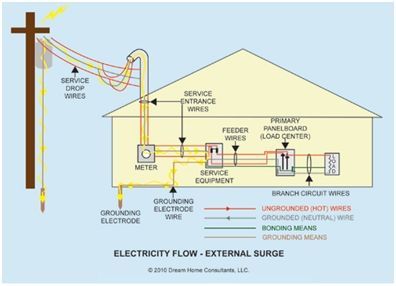
What is Electrical Grounding & Why it’s Important?
Share

How Does Electrical Grounding Work?
Electrical grounding is an essential part of every electrical system, yet many people don't know how it works. It involves connecting a conducting object, like a copper wire or metal rod, from the electrical panel to the earth's surface, which serves as a "ground." A grounding system provides a low-resistance path from a circuit to the earth, making sure that excess electrical current doesn't flow through the circuits and devices, which could lead to electrical shock or fire hazards. Grounding also helps limit electrical interference or "noise," which can compromise the quality of electronic signals. With proper grounding, electrical systems can operate efficiently and safely, giving you peace of mind knowing that your home or business is protected from any electrical issues.
Why is Electrical Grounding Important?
Electrical grounding is an important safety measure in any electrical system. Simply put, it is a method of providing a low-resistance path for electrical current to flow to the earth. But why is electrical grounding important? The most critical reason is safety. Grounding helps protect the system from electrical shock, fires, and other hazards such as electrostatic discharge (ESD). When electrical appliances and devices are grounded, excess electrical energy flows through the grounding wire instead of passing through people or objects. Additionally, grounding can improve the performance and reliability of the system by reducing noise and interference from surrounding electrical sources. Therefore, proper electrical grounding in any electrical system is essential to ensure safety and maximum efficiency.
How To Ground Yourself Electrically?
When it comes to electrical safety, grounding yourself is an essential practice that can protect you from electric shock, burns, and other hazardous electrical hazards. But how exactly do you ground yourself electrically? First and foremost, start by identifying the electrical equipment you will be working with, such as a power supply or electrical panel. Then, ensure that your hands and tools are dry and free of any moisture before handling them. Next, establish a reliable ground connection by using a grounding rod or wire with a resistance of less than one ohm. Make sure to test the connection for continuity before proceeding with any electrical work. By following these simple steps, you can safely and effectively ground yourself electrically, preventing the likelihood of any potential accidents or injuries. Remember, electrical safety should always be a top priority!
Grounding an electrical panel is crucial to ensure the safety of the entire electrical system. Without proper grounding, electrical surges and faults could lead to hazardous situations, such as electric shock or even electrical fires. Grounding can also prevent damage to sensitive electronic equipment and appliances. It's important to follow the National Electric Code (NEC) guidelines for grounding an electrical panel, which includes using the proper size and type of grounding conductor, connecting it to the grounding electrode system, and testing the grounding system regularly. By taking these safety measures, you can protect yourself and your property from potential electrical hazards.
